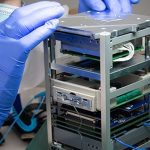With the 60 satellites set for launch, SpaceX will have delivered 180 signal relay stations to orbit for the companys Starlink Internet network.
 SpaceX test-fired a Falcon 9 rocket on Saturday at Cape Canaveral, two days before a scheduled launch with 60 Starlink broadband relay stations.
SpaceX test-fired a Falcon 9 rocket on Saturday at Cape Canaveral, two days before a scheduled launch with 60 Starlink broadband relay stations.
The launch is scheduled to take place at 6:19 am on Tuesday local time (9:19 pm EST on Monday). It will use a Falcon 9 rocket that has been launched and recovered on three previous missions.
It will take about an hour for the Falcon 9 rocket to deliver the third batch of Starlink satellites to orbit a couple of hundred miles above Earth.
The latest launch will kick off a brisk pace of launches by SpaceX planned for 2020.
SpaceX wants to create a mesh-like network around the Earth using its Starlink satellites rather than relying on a smaller number of higher-power satellites like traditional geostationary satellite operators.
The company has regulatory approval from the FCC to field a fleet of up to 12,000 small Starlink broadband stations and has hinted in additional regulatory filings that it could seek to operate up to 42,000 Starlink spacecraft.















































































